Articles
Mast cell activation symptoms are prevalent in Long-COVID
Leonard B Weinstock, Jill B Brook, Arthur S Walters, Ashleigh Goris, Lawrence B Afrin, Gerhard J Molderings (2021).
Safe administration of chemotherapy in mast cell activation syndrome
M P Lythgoe, J Krell, I A McNeish, L Tookman (2021). This article details a case report of a 59-year-old MCAS patient with endometrial cancer who received chemotherapy, with the aim to provide a framework for safer chemotherapy administration. It discusses the challenges of administering chemotherapy in patients with MCAS, highlighting hypersensitivity risks of carboplatin and paclitaxel, the role of desensitization protocols, and the need for tailored strategies to safely treat high-risk patients.
Selecting the Right Criteria and Proper Classification to Diagnose Mast Cell Activation Syndromes: A Critical Review
Theo Gülen, Cem Akin, Patrizia Bonadonna, Frank Siebenhaar, Sigurd Broesby-Olsen, Knut Brockow, Marek Niedoszytko, Boguslaw Nedoszytko, Hanneke N G Oude Elberink, Joseph H Butterfield, Wolfgang R Sperr, Ivan Alvarez-Twose, Hans-Peter Horny, Karl Sotlar, Juliana Schwaab, Mohamad Jawhar, Roberta Zanotti, Gunnar Nilsson, Jonathan J Lyons, Melody C Carter, Tracy I George, Olivier Hermine, Jason Gotlib, Alberto Orfao, Massimo Triggiani, Andreas Reiter, Karin Hartmann, Mariana Castells, Michel Arock, Lawrence B Schwartz, Dean D Metcalfe, Peter Valent (2021).
COVID-19 infection in patients with mast cell disorders including mastocytosis does not impact mast cell activation symptoms
Matthew P Giannetti, Emily Weller, Iván Alvarez-Twose, Inés Torrado, Patrizia Bonadonna, Roberta Zanotti, Daniel F Dwyer, Dinah Foer, Cem Akin, Karin Hartmann, Tiago Azenha Rama, Wolfgang R Sperr, Peter Valent, Cristina Teodosio, Alberto Orfao, Mariana Castells (2021).
Safety of COVID-19 vaccination in patients with mastocytosis and monoclonal mast cell activation syndrome
Rayan Kaakati, Dilawar Khokhar, Cem Akin (2021).
mRNA COVID-19 vaccine is well tolerated in patients with cutaneous and systemic mastocytosis with mast cell activation symptoms and anaphylaxis
Tiago Azenha Rama, André Moreira, Mariana Castells (2021).
Persistent Antiphospholipid Antibodies, Mast Cell Activation Syndrome, Postural Orthostatic Tachycardia Syndrome and Post-COVID Syndrome: 1 Year On
Jill R Schofield (2021)
Mast Cell Activation Syndrome: A Primer for the Gastroenterologist
Leonard B Weinstock, Laura A Pace, Ali Rezaie, Lawrence B Afrin, Gerhard J Molderings (2021). This article reviews gastrointestinal comorbidities in MCAS, including links to conditions such as Postural Orthostatic Tachycardia Syndrome (POTS) and hypermobile Ehlers_Danlos Syndrome (hEDS). It finds that gastrointestinal symptoms in MCAS are inflluenced by mast cell activation, autonomic dysfunction, and connective tissue abnormalities, requiring comprehensive diagnostic and therapeutic approaches.
Effect of Dietary Fiber and Metabolites on Mast Cell Activation and Mast Cell-Associated Diseases
Jelle Folkerts, Ralph Stadhouders, Frank A Redegeld, See-Ying Tam, Rudi W Hendriks, Stephen J Galli, Marcus Maurer (2018). This article provides an overview of current understandings surrounding the effects of dietary fibre on the regulation of mast cell activity and mast cell-associated diseases. It discusses the potential therapeutic effects of fibre and its metabolites (including short-chain fatty acids) on mast-cell associated airway inflammation and allergic diseases. It proposes further research to explore the role of dietary fibre in preventing and treating conditions associated with mast cell activation.
Inhibitory effects of curcumin on passive cutaneous anaphylactoid response and compound 48/80-induced mast cell activation
Yun-Ho Choi 1, Guang-Hai Yan, Ok Hee Chai, Chang Ho Song (2010) This article discusses the inhibitory effects of curcumin (the active component of turmeric) on mast cell activation and histamine release in mast cell-mediated allergic responses. It highlights curcumin’s mechanisms, including suppression of calcium influx and enhancement of intracellular cAMP levels, which reduce mast cell degranulation and histamine release. The findings suggest curcumin’s potential therapeutic role in managing mast cell-associated allergic diseases.
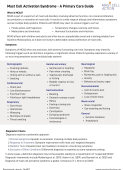
Mast Cell Activation Syndrome - A Primary Care Guide
A primary care guide to Mast Cell Activation Syndrome. It outlines common triggers, diagnostic criteria, and key symptom patterns affecting various body systems, helping clinicians recognise and differentiate MCAS from other conditions.
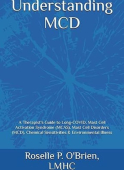
Understanding MCD by Roselle P. O'Brien LMHC
A 'Not-Just-For-Therapists' Guide....." This is written as a guide for therapist’s to help them understand Long Covid, Mast Cell Activation Syndrome (MCAS), Mast Cell Disorders (MCD), Chemical Sensitivities and Environmental Illness. However, it is not just for therapists, and others may also find it very useful.

Skin Symptoms Article
This article has been written by Helen Brown, BSc (Hons) Health Sci, MSc MHS and looks at the diagnostic consensus of skin symptoms in Mast Cell Activation Syndrome.
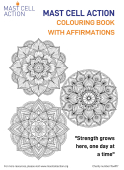
Mandalas Colouring Book with Affirmations
Relaxing and creative activities like mandala colouring can help foster mindfulness and calm a busy mind. Why not spend some time colouring in these beautiful mandalas, drawn by talented Mast Cell Action supporter Ivy Lewis, and lose yourself in your own creative vision. As each colour fills the spaces in this book, may your heart find calm, your mind find focus, and your spirit find strength. You are your own masterpiece.
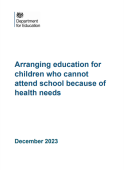
Arranging education for children who cannot attend school because of health needs
This guidance outlines how local authorities and schools can best support children who cannot attend school because of physical or mental health needs.
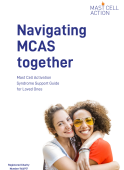
Navigating MCAS together - Mast Cell Activation Syndrome Support Guide for Loved Ones
This guide is for those who are supporting a loved-one with MCAS, and includes advice on maintaining your own physical and emotional health, as well as practical guidance on how you can support your loved-one.
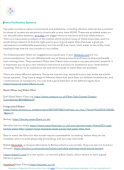
Introduction to Water Purifiers
Handout on different types of water purifiers, created by Deborah Bircham

MCAS and Long Covid
Mast cells are intrinsic immune cells present in connective tissues throughout the body, especially at tissue-environment interfaces. This document looks at the connection between MCAS and Long Covid.
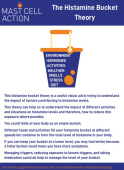
The Histamine Bucket Theory
This histamine bucket theory is a useful visual aid in trying to understand the impact of factors contributing to histamine levels.
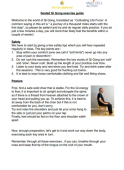
Seated Qigong Guide
This is a seated Qigong guide which focusses on posture, Neck, Shoulders and Spine.
Become a friend
Sign up to become a Friend of Mast Cell Action so we can keep you up to date on our progress and on how to get involved in our latest campaigns and initiatives.
Donate
Mast Cell Action relies entirely on the generosity of people like you. Please make a donation now and together we can make a difference to those affected by MCAS.







